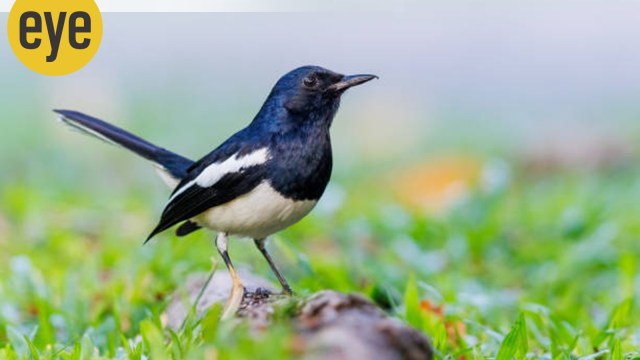The croon of the magpie-robin
He sings virtually non-stop from say, 5 am to sometimes as late as 9 am, by which time the sun is high and getting hot. And no, sensibly he does not indulge in the sort of leaping and prancing hijinks that many pop singers do
 Our maestro has not managed to attract a sloe-eyed gentle girlfriend but it’s still early days and here’s hoping that he will
Our maestro has not managed to attract a sloe-eyed gentle girlfriend but it’s still early days and here’s hoping that he willI returned to Goa in mid-December and wondered if my old friend and maestro, the magpie-robin, was still performing his early morning concerts from the terraces of the complex buildings. As we know, male birds usually sing to announce their tip-top health status, claim territory and woo a mate. Magpie robins begin to think about families around March and through the summer months. So I wondered if the maestro would have taken a couple of months off before resuming his concerts in say, February.
Happily, no, and this is one dedicated songster — his whistles and warbles wafted out in the silent early morning. Initially, I felt he was just trying out a few new compositions — the music seemed a bit disjointed — and I imagined him, stopping midway to make notations and corrections in his music sheets — the way most musicians do. But soon enough he had a repertoire going. The other (welcome) change was that now, instead of starting at 4.30 am, he would start singing at about 6 am. That was until one day, I awoke at 5 am and heard him in full flow. There is something magical about listening to a bird flute sweetly in that yogic, darkest hour before the dawn, bringing with it the tidings of a brand new golden day. The other thing I noticed was that he had seemed to have expanded the area of his operations and our complex was now not the only territory he was claiming. He would sing here for a bit, then fly off to the adjoining buildings and resume his concerts from other stages.
And no, he would not bore you by repeating his playlist. Every morning. it would be a new composition — fresh, clear and sweet. And again, from every different stage, the composition would change. Not too radically perhaps, but still be different.
He sings virtually non-stop from say, 5 am to sometimes as late as 9 am, by which time the sun is high and getting hot. And no, sensibly he does not indulge in the sort of leaping and prancing hijinks that many pop singers do — expending far more energy than would be necessary. Besides, you don’t need all these theatrics if you have genuine talent. Not to mention, outfitted in a formal tuxedo first thing in the morning — you can’t cavort about in one like a dervish and keep your dignity and the classical tradition intact! (Imagine a classical Indian singer tattooed to the eyeballs with rivets all over his or her body and a flaming orange hairdo, prancing around attempting an early morning raag!)
And then to my great delight, I realised that I was not the only one appreciating the maestro’s music. A couple of black drongos that did their morning callisthenics from a nearby mango tree, calling and fluting to each other as they tossed themselves into the sky like black blades (after sluggish early morning insects I presume), one morning settled on the railings of the water tank where the maestro was performing from. This water tank is the highest point in the complex and his main stage. They sat quietly, their heads cocked, and listened. Now drongos are past-master mimics and I wondered if they were listening with such devoted attention so that they could give their own magpie-robin renditions at some point. I mean so many singers belt out the numbers of the original composers (often ruining them), so why not these shiny black fellows? But I’m still wondering to what purpose — except that it would expand (and improve) their repertoire and maybe impress their girlfriends.
The drongos were not the only avian fans of the performance. One morning, a pair of jungle mynas landed and perched on the water tank railings. Jungle mynas are somewhat raffish-looking, dark grey birds, with wild, rolling eyes and a (pollen) brush on their foreheads, imparting them a somewhat bohemian look. Mynas are very good vocalists too, though I’ve never heard jungle mynas sing. These guys seemed more the kind that would appreciate raucous off-key heavy metal belting out of giant speakers than the sweet classical flutings of our maestro. But they sat and listened quietly and reverently before flying off after a while.
But what was truly touching was when a couple of crows turned up and perched respectfully on the water tank, their heads too cocked as the maestro continued to sing unperturbed. Crows, though they may be the cleverest of all birds, are not the kind you would think are classical music aficionados. Oh yes, I know that even crows have their gentler side but usually, they seem to prefer destroying the nests of other birds and dining on eggs and fledglings. This pair seemed really cultured — maybe that’s what came of living in Goa instead of places like Delhi!
Alas, it was too good to last! This morning, as I listened to our maestro, a single rascal crow flew up to the water tank, and hustled the maestro off it, mid-concert — in the same brutish manner the PM’s security does to you and me when he has to drive past at 120 kmph to save the nation. Nothing daunted the maestro simply flew off to one of the adjoining blocks and resumed his concert from there. No petulant tantrum was thrown even though it must have felt like being hustled off stage at gunpoint!
So far, our maestro has not managed to attract a sloe-eyed gentle girlfriend but it’s still early days and here’s hoping that he will, sooner rather than later!
- 01
- 02
- 03
- 04
- 05































